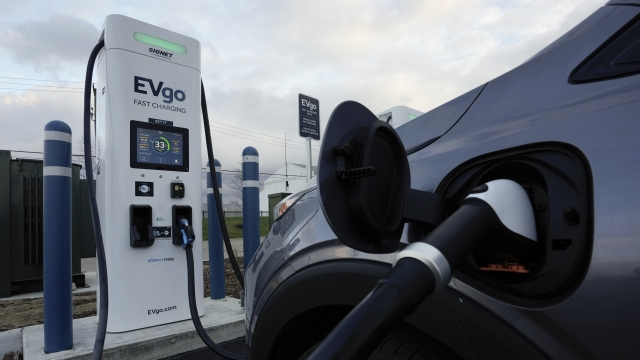The EPA proposed its strictest-ever vehicle emissions standards Wednesday, a requirement that could mean up to two thirds of all new cars sold in the U.S. must be electric vehicles by 2032.
The announcement follows years of promises from the Biden administration to tighten restrictions on gas-powered vehicle sales. It comes less than two years after automakers agreed to target half of U.S. car sales as electric vehicles by 2030.
The new EPA proposal, though — which the agency wants to take effect with model year 2027 — isn't voluntary. It would cut allowable levels of carbon dioxide emissions so drastically that automakers would have no choice but to sell mostly electric cars in order to comply.
Car manufacturers are well on their way to complete electrification. But some in the industry bristled at the sky-high goals in the EPA's new proposal.
"To be clear, 50% was always a stretch goal and predicated on several conditions," John Bozzella, head of the Alliance for Automotive Innovation, wrote in a statement Wednesday. "Those included supportive policies like the manufacturing incentives in the Inflation Reduction Act, that have only just begun to be implemented, and tax credits to support EV purchases and affordability."
SEE MORE: Biden administration proposes historic vehicle pollution limits
And industry watchers are wary of the country's readiness to support the increased electricity demand that would result from increased EV sales.
"In California, last September we had a brutal heat wave where our electricity could have had some blackouts if consumers didn't reduce their electricity load a little bit," Ethan Brown, who runs a website and podcast on climate change and clean energy, told Scripps News. "Similarly in Texas, they've seen cold waves where their grid goes offline. And adding a ton of electric vehicles to that grid, you need to have the electricity capacity to upkeep that."
Still, Brown said, the move is a potent measure to curb the worst impacts of climate change. And preexisting laws may not have left the agency with much choice.
"The Clean Air Act kind of requires the EPA to do this and keep up," Brown said.
EPA Administrator Michael Regan sounded bullish in the wake of the announcement.
"We know that we'll see charging stations all across this country, so that we can reduce that range anxiety " he told CNN. "And people will have a number of years that they can take advantage of these tax credits."
The EPA's proposed rule will get a public comment period before the agency looks to implement it later this year.
Trending stories at Scrippsnews.com




